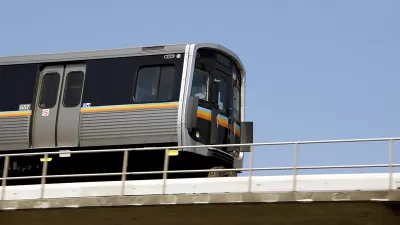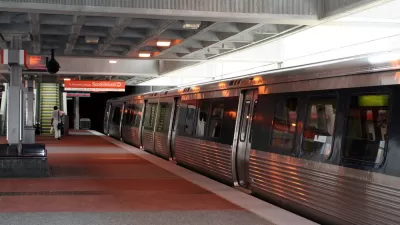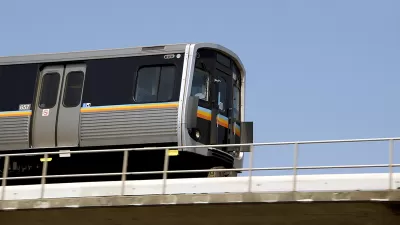Transit activists celebrated the good news that residents will finally be given the opportunity to join the Metropolitan Atlanta Rapid Transit Authority but bemoaned that they would have to wait till March 2020 to vote on the one percent sales tax.

"Gwinnett took a once unimaginable step Tuesday when its commission voted to formally adopt a new transit development plan, one that opens up the possibility of extending heavy rail several miles into the county," reported Tyler Estep for The Atlanta Journal-Constitution on July 17.
Now officials have to make another potentially momentous decision, and quick: Will they give voters the chance to weigh in on transit expansion this November? Or wait until next year?
The answer came Wednesday morning, reports Tony Thomas for WSB-TV Channel 2. The commission approved the contract [pdf] on a 4-1 vote.
The vote was decades in the making. Commissioners approved hiring MARTA to run the buses and, potentially, run future train service into the county.
The leaders also agreed to let voters have the final say in a referendum on March 19, an about-face from the previously announced November ballot.
Gwinnett County Chair Charlotte Nash expressed disappointment with the change of date. Her colleague, Lynette Howard, told Thomas on July 18. "I support having a referendum in November to allow Gwinnett residents to have a voice in the transit decision..." However, Estep and David Wickert of The Atlanta Journal-Constitution report that the date for the referendum vote was recorded in a second, unanimous vote.
"Democrats and others charged the commission of pushing back the transit referendum — the approval of which would enact a new one-cent transit-funding sales tax and help pave the way for heavy rail in Gwinnett — so it would not drive Democratic turnout during the Nov. 6 general election," reports Estep after the vote. In addition, Gabe Okoye, the chairman of Gwinnett’s Democratic Party, suggested that the off-cycle election would attract more opponents of the tax measure.
An AJC "Political Insider" blog by Jim Galloway, Greg Bluestein and Tamar Hallerman on the referendum vote confirmed Okoye's perspective.
A spring referendum would likely result in a smaller turnout. Older voters would be the ones most likely to show up. Fewer voters can put more control in the hands of those pushing for approval -- it’s the same strategy that local governments apply to SPLOST [special purpose local option sales and use tax] votes. But older voters are also more resistant to change, and are less likely to be daily commuters. Turnout is likely to be more Republican.
In a post-mortem on the defeat of Nashville Transit referendum on May 1, there was no mention of attributing the rejection to a special rather than general election date. It does mention the failure of the first Kansas City streetcar referendum on August 2, 2014. In the Seattle area, King County rejected a bus transit measure on April 22, 2014. And much closer to home, metro Atlanta rejected a transportation sales tax measure on July 31, 2012.
Angie Schmitt also reports on Wednesday's vote for Streetsblog USA, and notes the historical importance of allowing the referendum in a 2017 piece:
"Voters in suburban Gwinnett County rejected MARTA three separate times 'under a cloud of racialized rhetoric,'" wrote Jason Henderson, a geography professor at San Francisco State University, in a 2006 paper on transit in the Atlanta metropolitan area.
One additional challenge to consider, adds WSB-TV's Thomas, is " a new state law requires that, if the contract between MARTA and Gwinnett County isn’t signed before the first of the year, the new regional authority called The ATL, or The Atlanta-region Transit Link Authority, would need to have a say, too." [See late-breaking update below].
According to the Atlanta Regional Commission, ATL is charged with "[d]eveloping a regional transit plan for a 13-county area -- Cherokee, Clayton, Coweta, Cobb, DeKalb, Douglas, Fayette, Forsyth, Fulton, Gwinnett, Henry, Paulding, and Rockdale counties."
Related in Planetizen:
"Gwinnett [County] today is paying the price for not approving MARTA decades ago," according to an op-ed posted in September 2016, "A Message to Suburban Counties: Invest in Transit or Get Left Behind." The article focuses on economic development in the Atlanta metro area.
Hat tip to Art Sheldon.
Update: "The MARTA Board of Directors on Thursday postponed action on a deal that could allow the agency to expand into Gwinnett County, for decades a hotbed of resistance to transit," report Estep and Wickert on Thursday.
MARTA Board members praised the deal but wanted more time to review it. Nonetheless, Chairman Robbie Ashe hailed the measure as an historic achievement that could benefit all of metro Atlanta.
FULL STORY: Gwinnett approves contract with MARTA, calls for March vote

Study: Maui’s Plan to Convert Vacation Rentals to Long-Term Housing Could Cause Nearly $1 Billion Economic Loss
The plan would reduce visitor accommodation by 25,% resulting in 1,900 jobs lost.

Alabama: Trump Terminates Settlements for Black Communities Harmed By Raw Sewage
Trump deemed the landmark civil rights agreement “illegal DEI and environmental justice policy.”

Why Should We Subsidize Public Transportation?
Many public transit agencies face financial stress due to rising costs, declining fare revenue, and declining subsidies. Transit advocates must provide a strong business case for increasing public transit funding.

Paris Bike Boom Leads to Steep Drop in Air Pollution
The French city’s air quality has improved dramatically in the past 20 years, coinciding with a growth in cycling.

Why Housing Costs More to Build in California Than in Texas
Hard costs like labor and materials combined with ‘soft’ costs such as permitting make building in the San Francisco Bay Area almost three times as costly as in Texas cities.

San Diego County Sees a Rise in Urban Coyotes
San Diego County experiences a rise in urban coyotes, as sightings become prevalent throughout its urban neighbourhoods and surrounding areas.
Urban Design for Planners 1: Software Tools
This six-course series explores essential urban design concepts using open source software and equips planners with the tools they need to participate fully in the urban design process.
Planning for Universal Design
Learn the tools for implementing Universal Design in planning regulations.
Smith Gee Studio
Alamo Area Metropolitan Planning Organization
City of Santa Clarita
Institute for Housing and Urban Development Studies (IHS)
City of Grandview
Harvard GSD Executive Education
Toledo-Lucas County Plan Commissions
Salt Lake City
NYU Wagner Graduate School of Public Service




























